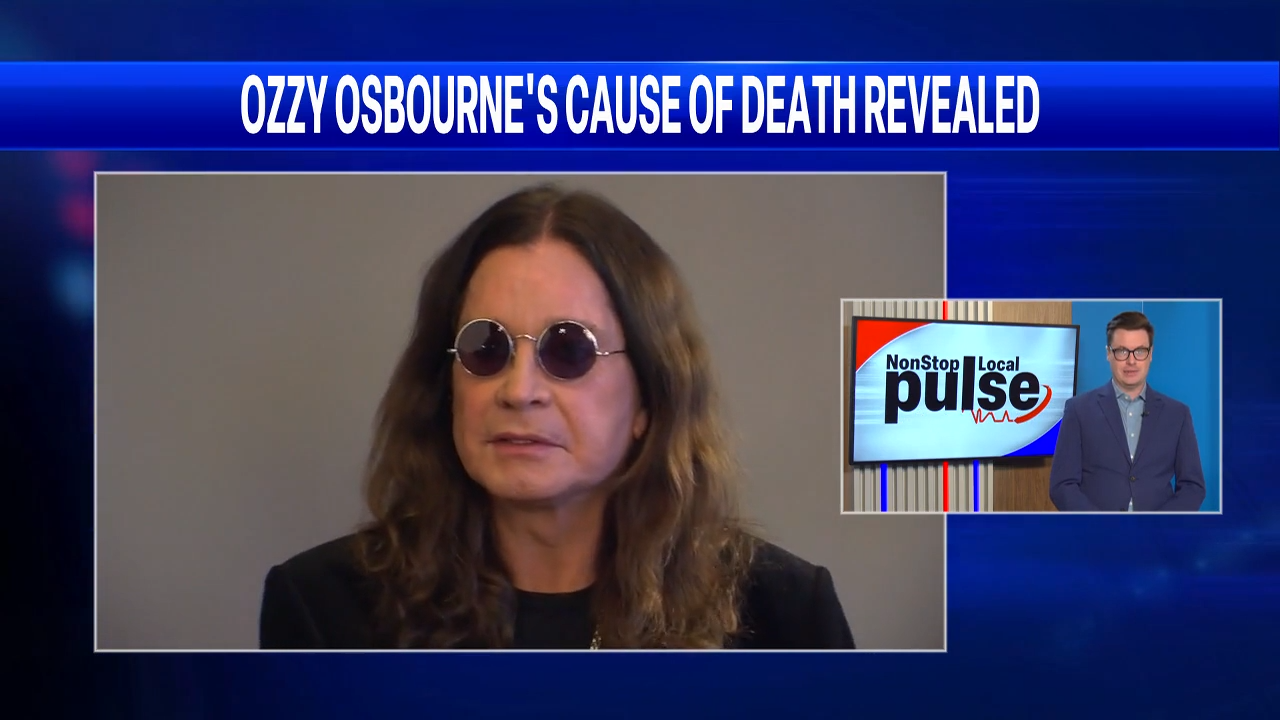The Final Curtain: Ozzy Osbourne Died of a Heart Attack, Report Says
In a revelation that shook the rock world to its core, Ozzy Osbourne died of a heart attack, according to his official death certificate—an unceremonious end for one of music’s most iconic and enduring figures. As tributes flood in and fans around the world mourn the loss of the “Prince of Darkness,” this isn’t just the end of a life—it’s the close of a cultural era.
Ozzy wasn’t just a rock star. He was a movement, a myth, and a living, snarling symbol of rebellion. And yet, like all legends, his story was made painfully human in the most mortal way: a sudden cardiac event.
The Legend Who Refused to Burn Out
For over five decades, Ozzy Osbourne defined the sound of heavy metal and redefined the boundaries of rock culture. His voice—at once haunting and commanding—was the soundtrack of angst, rebellion, and raw emotional catharsis. From his formative days with Black Sabbath to his solo anthems like Crazy Train and Mr. Crowley, Ozzy transformed pain into power, chaos into catharsis.
But behind the leather, eyeliner, and infamous antics was a man who carried deep scars, physical and emotional. His life was a long, often brutal dance with addiction, injury, and illness. And yet he always emerged—battered but unbroken. That made the news of his passing all the more jarring.
A Quiet Morning, A Thunderous Goodbye
The Osbourne family has confirmed that Ozzy passed away peacefully in his sleep. The death certificate lists the cause as myocardial infarction—commonly known as a heart attack. There were no drawn-out hospital scenes, no media fanfare. Just the quiet end of a thunderous life. Fans hoped he would bounce back once again, as he always had, but this time, fate had other plans.
The shock isn’t just about the loss. It’s about the silence that followed. For a man whose voice electrified millions, whose every step made headlines, his final breath came quietly. No stadium farewell. No encore. Just an end.
More Than Music: Ozzy as a Cultural Monument
To say Ozzy Osbourne changed music would be an understatement. He changed identity. He changed what it meant to be a rock star. He was chaos incarnate, a swirling mix of vulnerability, madness, and genius. And in being so, he gave a generation permission to feel broken—and still be powerful.
His story was one of triumph and tragedy. Fired from Black Sabbath, he reinvented himself with a solo career that arguably outshone his first act. He gave us not only music but unforgettable imagery—a bat, a dove, a haunted mansion of sonic horror that resonated with outsiders and dreamers alike.
He was also one of the first true crossover stars of reality television. The Osbournes offered a deeply human and often hilarious portrait of a man we thought we knew. Here, the “Prince of Darkness” stumbled over dogs, mumbled sweet nothings to his wife Sharon, and battled remote controls. He was a legend who made you laugh. And that made you love him more.
Sharon, the Anchor of the Storm
Ozzy’s passing has left a particularly deep wound in his family—none more than in his wife, manager, and eternal anchor, Sharon Osbourne. Their relationship was never simple, but it was always real. Through drug overdoses, infidelities, cancer battles, and rehab visits, they stood by each other. Her voice was the only one that could steady him. And now, she faces a world without him.
In a brief but emotional statement, Sharon wrote:
“The world has lost a legend, and I have lost my heart. He died in peace, but I don’t know when mine will find peace again.”
Her grief resonates far beyond the stage lights. It’s a reminder that behind every rock god is a real man—and behind every legend is a family left to grieve.
Fan Tributes Turn Streets Into Shrines
Since the news broke, a global wave of mourning has emerged. From Los Angeles to London, fans are turning street corners into candlelit altars. They hold guitars, wear eyeliner, and sing his lyrics into the wind. Some paint murals. Others simply cry. The world feels a little emptier without him.
Outside his birthplace in Birmingham, UK, where it all began, fans gathered to light candles and play Sabbath records in the rain. Many said they felt like they lost a part of their youth. One fan, tears streaming down her face, said simply:
“Ozzy made the darkness feel like home.”

A Body That Bore the Burden
That Ozzy lived as long as he did is a miracle. He once joked, “By all rights, I should be dead.” Years of substance abuse, a near-fatal ATV crash, a Parkinson’s diagnosis, spinal surgery, and repeated hospital visits—the list of battles his body endured is staggering.
And still, he toured. Still, he screamed. Still, he staggered onstage and poured his soul into every show. He once canceled a farewell tour, only to announce a comeback tour two years later. He refused to quit. His body broke before his spirit did.
And that is what makes his death—of something as common as a heart attack—feel strangely poetic. The man who defied every odd was finally claimed by the one thing none of us can escape: being human.
His Final Album: A Whisper of Goodbye?
Ozzy’s final studio album, Patient Number 9, was a hauntingly beautiful swan song. Lyrics filled with mortality, regret, and reflections on legacy now read like premonitions. He sang of time running out, of being forgotten, of looking for redemption. And now we listen differently.
One of the most powerful lines:
“I’ve waited here for you forever / Can’t you see that I’m not dead yet?”
He wasn’t dead when he wrote it. But he was preparing us. And maybe, in some way, he was preparing himself.
A Rock God’s Afterlife
So what now?
Ozzy Osbourne will not be remembered as a flawless man. He was messy. Complicated. Contradictory. But he was also deeply beloved. His influence spans generations. Metalheads worshipped him. Punks respected him. Even pop stars borrowed from his grit.
He was a father, a husband, a myth, and a maker of dreams.
In death, as in life, Ozzy Osbourne remains unforgettable. He didn’t fade away. He went out as he lived—unexpected, defiant, and larger than death itself.
The Heartbeat That Echoes Forever
It may have been a heart attack that silenced Ozzy Osbourne. But what a heart it was.
A heart that pumped rage and rhythm into songs that saved lives. A heart that broke and rebuilt again and again. A heart that loved fiercely—his fans, his family, his music.
Yes, Ozzy Osbourne died of a heart attack. But more importantly, he lived with his heart wide open.
And that’s what we’ll remember.
Social Reflections: A World in Mourning
- Twitter/X: #RIPOzzy trends globally, with fans quoting “Mama, I’m coming home”.
- Instagram: Flooded with tribute art, vinyl photos, and throwback tour posters.
- TikTok: Gen Z discovering his reality show era, laughing through the tears.
- YouTube: Streams of his live performances spike overnight—his final roars playing on repeat.
Across every platform, one truth remains: Ozzy Osbourne was more than a musician. He was a force. A father of genre. A friend in the darkness.
And now, that darkness feels a little more empty without him.
Final Words
Ozzy Osbourne’s death certificate may officially read “myocardial infarction.” But for millions of fans, his legacy is far more powerful than any clinical term.
He was the voice in your headphones when no one else understood. The scream that matched your silent pain. The chaos you needed to feel alive.
He’s gone, yes. But Ozzy Osbourne will never be dead.
Because legends don’t die. They echo.
#RIPOzzyOsbourne
#PrinceOfDarknessForever
#OzzyOsbourneDiedOfAHeartAttack
Let your friends and fellow fans know how you first discovered Ozzy. What song changed you? What memory still makes you smile or cry?
